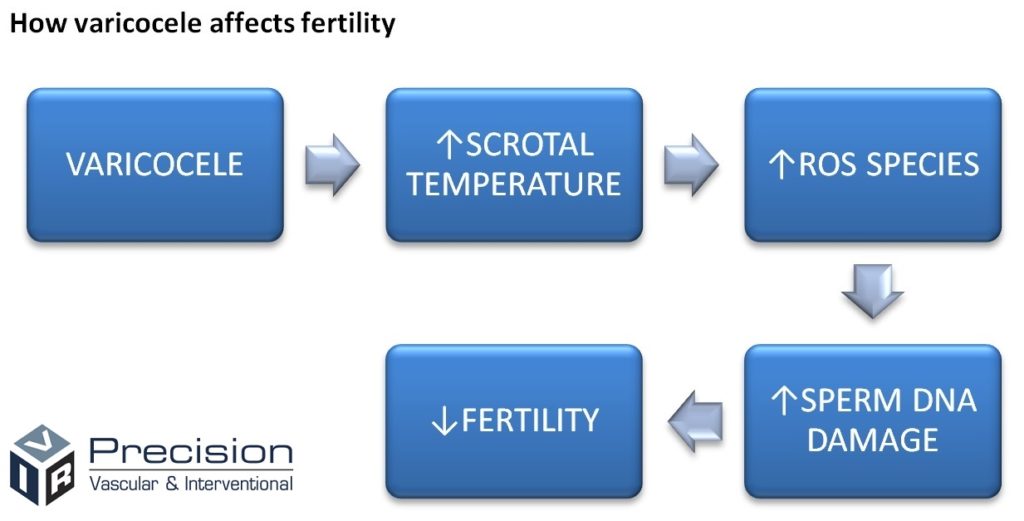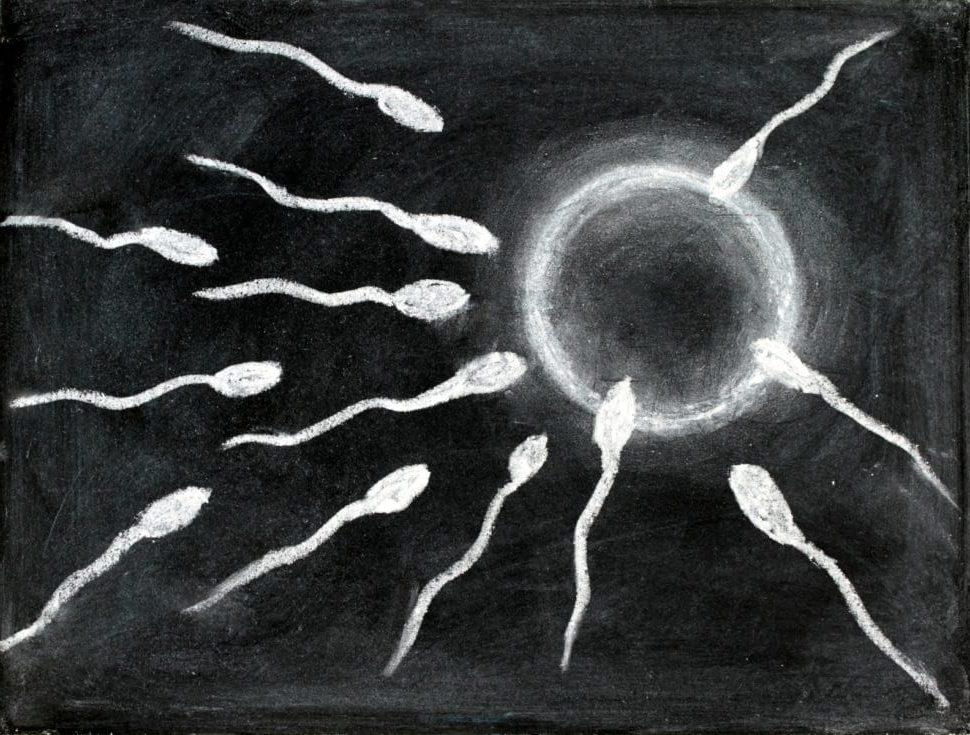Is There a Link Between Varicoceles and Male Infertility?
Varicoceles are the engorged and twisted veins that develop in the scrotum. They are similar to the varicose veins that occur in the legs. Small varicoceles may go unnoticed whereas the larger ones can give rise to a dull pain or heaviness in the scrotum. On touching, the dilated veins may be felt like a “bag of worms.” But is there a link between varicoceles and male infertility?
Yes. Varicoceles are one of the most common causes of male infertility affecting about 17% to 41% of infertile men.1 The male-factor is responsible for nearly 40% to 50% of infertility cases.2 That being said, not all men with varicoceles are infertile.
An interesting fact about varicoceles is that they most often occur in men in whom infertility is due to factors other than varicocele, termed as secondary infertility. Luckily, these men have greater chances for future fertility following treatment of the underlying cause.
What Causes Varicoceles and Male Infertility?
The vast majority of varicoceles involve the left testicle because the pressure within the left-sided veins is greater than that of the right-sided vessels draining the testis. The blood from the left testicle may not drain as fluently as that from the right due to a bend in the vein close to the left kidney. This can cause the left-sided veins to become more tortuous and dilated.
Also, in some men—the left-sided testicular vein may lack competent valves—which normally function to keep the blood on a one-way track towards the heart. Poorly developed testicular valves will cause the blood to gush back in the wrong direction, paving the way to a varicocele.
How do Varicoceles Impair the Reproductive Potential in Men?

Figure 1: How varicocele affects fertility
Varicoceles can contribute to infertility in a variety of ways; we’ll explore some of the important ones:
Does Varicocele Repair Restore Fertility?
Studies reveal that repairing a varicocele can restore the testosterone levels, sperm count, the function of the testicles—and eventually the fertility in men.7 This further draws attention to infertility caused by varicoceles.
Varicocele repair can improve the sperm survival and growth in about 70% of men. It can, however, help achieve natural pregnancy in only about 30% of cases.8
The success rate of varicocele repair depends on a variety of factors, including but not limited to:9
- The technique of surgical repair employed
- The baseline sperm count (lower sperm counts negatively impact the success rates)
- The baseline sperm motility
- The baseline hormone levels, primarily including testosterone (T) and follicle-stimulating hormone (FSH):
- Higher FSH and low testosterone may signal a poor outcome. FSH is a hormone released from a gland in the brain. In men with varicocele, FSH rises because of the loss of inhibition from special kind of cells in the testes whereas T declines due to impaired function of another type of testicular cells.
- The size of varicocele (the larger the varicocele, the greater is the chance of success with treatment)
- The size of the testicles (shriveled testicles may predict a poor outcome after surgery)
- The duration of infertility (the longer the time spent being infertile, the less are the chances of conceiving naturally)
- The extent of DNA fragmentation or damage
What are the factors that necessitate Varicocele Repair?
It is interesting to note that not all varicoceles require treatment. Your doctor will usually consider treatment when you’re trying to conceive in the presence of following factors:
- You display an abnormal semen analysis or abnormal results on sperm function tests
- The varicocele can be felt by the doctor on examining the scrotum
- You have known infertility
- Your female partner is capable of conceiving or has a potentially treatable cause of infertility
How long does it take for the fertility to be restored after Repair?
Varicocele repair is not a magic bullet. It may take up to 6 months for factors that triggered infertility (such as oxidative stress, levels of free radicals, and DNA damage) to recede after repair of varicocele.10 Thus, it is wise to try conceiving somewhere around 6 months after surgery when all the triggers have subsided, or at least started to subside.
Varicocele embolization is a viable alternative to traditional surgical ligation of varicoceles (Varicocelectomy)
At Precision VIR we are leading experts in minimally-invasive treatment of varicoceles. Varicocele embolization treats the varicocele from the root (gonadal vein) and is a more extensive and comprehensive treatment than just local surgical ligation. Success rates are comparable to surgery without the recovery time and pain related to surgery. Schedule a consultation with our varicocele experts today to explore your options for treatment by calling 214-282-3200 or complete the form below.
Precision VIR serves the DFW area including Dallas, Fort Worth, Carrollton, Richardson, Garland, Mesquite, Highland Park, University Park, Park Cities, Plano, Frisco, Allen, McKinney, Arlington, Irving, Grand Prairie, Denton, Lewisville, Flower Mound and all of North Texas.
This information is not a substitute for professional medical advice. Prior to starting any new treatment or questions regarding a medical condition, always seek the advice of your doctor or other qualified health provider.
References
- Janghorban-Laricheh E, Ghazavi-Khorasgani N, Tavalaee M, Zohrabi D, Abbasi H, Nasr- Esfahani MH. An association between sperm PLCζ levels and varicocele? Journal of Assisted Reproduction and Genetics. 2016;33(12):1649-1655. doi:10.1007/s10815-016-0802-5.
- Kantartzi PD, Goulis CD, Goulis GD, Papadimas I. Male infertility and varicocele: myths and reality. Hippokratia. 2007;11(3):99-104.
- Kantartzi PD, Goulis CD, Goulis GD, Papadimas I. Male infertility and varicocele: myths and reality. Hippokratia. 2007;11(3):99-104.
- El-Sayed SH, Desouky EA, Tarek AE et al. Sperm DNA damage in varicocele patients. Sperm DNA damage in varicocele patients. Human Andrology. 2012;2(3):70-74.
- Hayden RP, Tanrikut C. Testosterone and Varicocele. Urol Clin North Am. 2016;43(2):223-32. doi: 10.1016/j.ucl.2016.01.009.
- Camoglio FS, Zampieri N, Corroppolo M et al. Varicocele and retrograde adrenal metabolites flow. An experimental study on rats. Urol Int. 2004;73(4):337-42.
- Fisch H, Hyun G. Varicocele repair for low testosterone. Curr Opin Urol. 2012;22(6):495-8. doi: 10.1097/MOU.0b013e328358e0fb.
- Cyrus A, Kabir A, Goodarzi D, Moghimi M. The effect of adjuvant vitamin C after varicocele surgery on sperm quality and quantity in infertile men: a double blind placebo controlled clinical trial. International Brazilian Journal of Urology : official journal of the Brazilian Society of Urology. 2015;41(2):230-238. doi:10.1590/S1677-5538.IBJU.2015.02.07.
- Samplaski MK, Jarvi KA. Prognostic factors for a favorable outcome after varicocele repair in adolescents and adults. Asian Journal of Andrology. 2016;18(2):217-221. doi:10.4103/1008-682X.169558.
- Dada R, Shamsi MB, Venkatesh S, Gupta NP, Kumar R. Attenuation of oxidative stress & DNA damage in varicocelectomy: Implications in infertility management. The Indian Journal of Medical Research. 2010;132(6):728-730.



